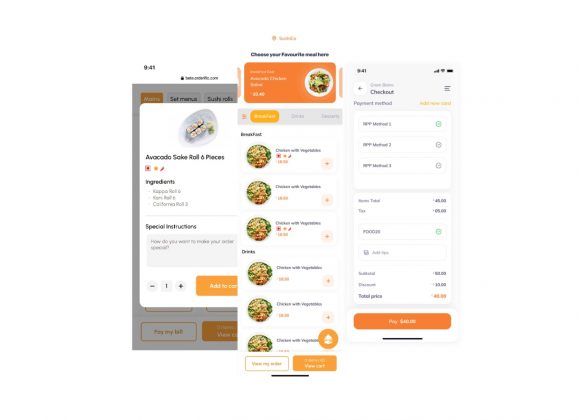
People become vegetarians for many reasons, including health, religious convictions, environmental concerns, and love for animals. A vegetarian diet can offer significant health benefits to your body as we can get most of our calories from grain products, vegetables, and fruits. This diet focuses more on eating plant-based foods.
Around 70% of all diseases, including one-third of all cancers type, are related to diet. A vegetarian diet can reduce the risk of chronic degenerative diseases, such as obesity, coronary artery disease, and high blood pressure.
According to the American Dietetic Association, appropriately planned vegetarian diets are healthful, nutritionally adequate, and can help to prevent and treat certain diseases.
Generally, vegetarian diets include non-animal products, like fruits, vegetables, grains, and nuts, and exclude animal byproducts, like eggs and dairy. A vegetarian diet can be categorized into the following groups:
- Vegans: Do not eat meat, poultry, fish, or any products derived from animals, including eggs, dairy products, and gelatin.
- Lacto-ovo vegetarians: Do not eat meat, poultry, or fish, but eat eggs and dairy products.
- Lacto vegetarians: Eat no meat, poultry, fish, or eggs but consume dairy products.
- Ovo vegetarians: Eat no meat, poultry, fish, or dairy products, but do eat eggs.
Let’s explore some of the unique benefits of eliminating meat from diet and a Lacto-ovo vegetarian diet.
1. Boost Heart Health
Cardiovascular diseases kill around 1 million people in America yearly and are the greatest cause of death in the country. However, vegetarians were 25% less likely to die of heart disease.
A vegetarian diet includes lower levels of saturated fats than meat-based diets. This prevents the progression of coronary artery disease. Thus, the mortality rate for cardiovascular disease is lower in vegetarians than in nonvegetarians.
A vegetarian diet can improve your heart health by lowering.
- Blood pressure – The soluble fiber in fruits helps reduce cholesterol levels, thus lowering blood pressure.
- Risk of cardiac events (such as heart attack) and death from cardiac causes.
- Cholesterol – Plant-based foods contain high-fiber and unsaturated fats, which help to keep blood sugar levels steady.
2. Help the Environment
People can save the environment by eating a vegetarian diet since animals require more land and water than plants to survive and grow. A vegetarian diet requires less than half of the agricultural land for breeding animals for meat.
A study suggests that a vegetarian diet could reduce water consumption by 27% to 41%.
Around 10 billion animals are slaughtered for human consumption each year. According to the U.S. Environmental Protection Agency (EPA), chemical and animal waste runoff from factory farms pollute more than 173,000 miles of rivers and streams.
3. Prevent Type 2 Diabetes
Obesity and fat distribution in the body are two risk factors of Type 2 diabetes that you can avoid with a vegetarian diet. A study shows that the risk of developing diabetes in vegetarians is 35% to 53% lower than that of nonvegetarians.
A vegetarian diet reduces saturated fats and fatty tissues, which make the body more resistant to insulin. Compared with meat eaters, vegetarians consume more fiber and antioxidants, vitamins, folic acids, potassium, magnesium, and phytochemicals, such as carotenoids.
These nutrients help lower LDL (bad) cholesterol, blood pressure, and body mass index (BMI), which reduces the risk for many chronic diseases.
4. Manage weight
Plant-based diets can help you manage your weight. However, a vegetarian diet could cause you to gain weight if your meal size is too large or you eat more high-calorie or high-fat foods.
A study suggests that overweight people who follow a low-fat, vegetarian diet lose weight without measuring portions or feeling hungry.
5. Keep Your Brain Sharp
A vegetarian diet can help you keep your brain healthy. Consuming plant-based and whole grains foods rich in polyphenols slows the progression of neurodegenerative diseases.
Studies have shown that consuming more plant-based foods can lower the risk of dementia, Alzheimer, and cognitive impairments.
6. Prevent cancer
Eliminating red meat and processed meats from your diet helps you avoid certain cancer types, including colon, breast, rectum, prostate, pancreatic, stomach, lung, and esophageal cancer.
Plant-based foods contain phytochemicals that may help protect your cells from damage. Thus, reducing your risk of developing cancer. Studies suggest that vegetarians have a lower incidence of cancer than nonvegetarians do.
7. Reduce the Risk of Food-Borne Illness
According to the U.S. Food and Drug Administration (FDA), protein-rich foods, such as meat, poultry, fish, and seafood, are frequently involved in food-borne illness outbreaks.
The EPA evaluates that nearly 95% of the pesticide residue in the diet comes from meat, fish, and dairy products. Fishes majorly contain carcinogens and heavy metals that are difficult to remove even after cooking or freezing.
8. To build strong bones
Plant-based foods also supply other nutrients such as phosphorus, magnesium, and vitamin D that are necessary for the body to absorb and use calcium.
People can choose from a wide variety of dairy products to get a healthful dose of calcium, such as yogurt, cheese, dry beans, tofu, soy milk, and dark green vegetables like broccoli, kale, collards, and turnip greens.
How Orderific can help restaurants
Orderific enables restaurant owners to set up a digital menu, website, loyalty programs, and payment process for their customers. It also lets them manage their inventory and market their restaurant for free.
With Orderific, restaurants can highlight healthy ingredients and the nutritional value of dishes on the menu. It is an easy-to-use free web-based service that does not require heavy software downloads.
Customers can use Orderific to:
- Get fast service and delivery
- Customize their orders
- Access QR code menus
- Avoid waiting for their order
- Order and pay online
- Get coupons and discounts while exploring the digital menu
- Sign up for loyalty programs
You can connect with our team to discuss the benefits in detail.
Conclusion
A vegetarian diet could help you boost your overall health and reduce your risk for health diseases if you follow recommended guidelines on nutrition, fat consumption, and weight control.
Eating a lot of vegetables and fruits means consuming more fiber, which removes excess waste from the body. They can also help you remain healthy by providing necessary nutrients, vitamins, and minerals for the body.
There are a variety of vegetarian meals that can fit your nutritional needs and food preferences. Ensure that you eat a wide variety of fruits, vegetables, and whole grains with good fats. And always practice portion control, read food labels, and engage in regular physical activity.
Visit Orderific website for more information like this!












